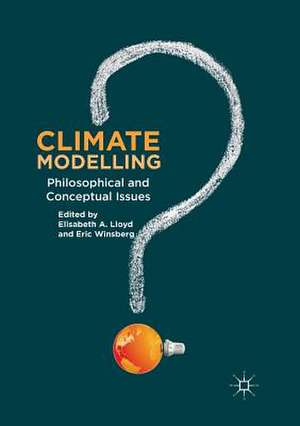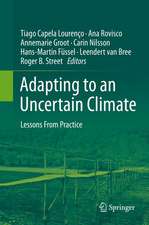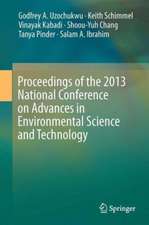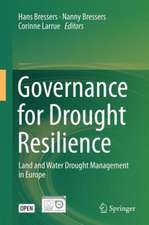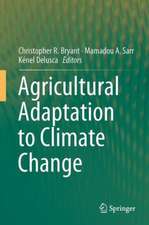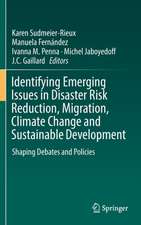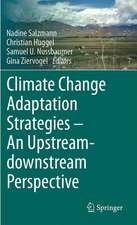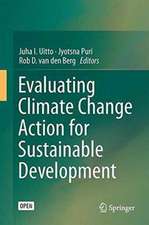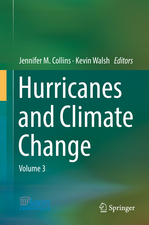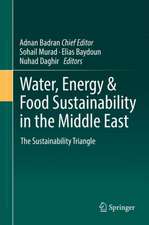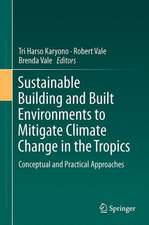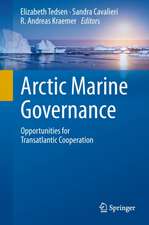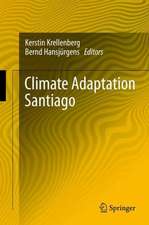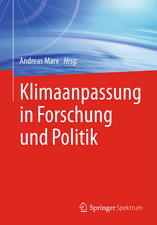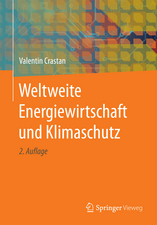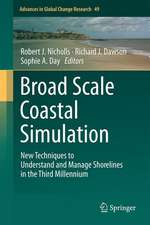Climate Modelling: Philosophical and Conceptual Issues
Editat de Elisabeth A. Lloyd, Eric Winsbergen Limba Engleză Paperback – 4 iun 2019
Climate Modelling provides an early and significant contribution to the burgeoning Philosophy of Climate Science field that will help to shape our understanding of these topics in both philosophy and the wider scientific context. It offers insight into the reasons we should believe what climate models say about the world but addresses the issues that inform how reliable and well-confirmed these models are.
This book will be of interest to students of climate science, philosophy of science, and of particular relevance to policy makers who depend on the models that forecast future states of the climate and ocean in order to make public policy decisions.
| Toate formatele și edițiile | Preț | Express |
|---|---|---|
| Paperback (1) | 1389.58 lei 6-8 săpt. | |
| Springer International Publishing – 4 iun 2019 | 1389.58 lei 6-8 săpt. | |
| Hardback (1) | 1394.03 lei 6-8 săpt. | |
| Springer International Publishing – 26 feb 2018 | 1394.03 lei 6-8 săpt. |
Preț: 1389.58 lei
Preț vechi: 1694.61 lei
-18% Nou
Puncte Express: 2084
Preț estimativ în valută:
265.89€ • 277.61$ • 220.06£
265.89€ • 277.61$ • 220.06£
Carte tipărită la comandă
Livrare economică 04-18 aprilie
Preluare comenzi: 021 569.72.76
Specificații
ISBN-13: 9783319879390
ISBN-10: 3319879391
Pagini: 497
Ilustrații: XXXIII, 497 p. 33 illus.
Dimensiuni: 148 x 210 mm
Greutate: 0.69 kg
Ediția:Softcover reprint of the original 1st ed. 2018
Editura: Springer International Publishing
Colecția Palgrave Macmillan
Locul publicării:Cham, Switzerland
ISBN-10: 3319879391
Pagini: 497
Ilustrații: XXXIII, 497 p. 33 illus.
Dimensiuni: 148 x 210 mm
Greutate: 0.69 kg
Ediția:Softcover reprint of the original 1st ed. 2018
Editura: Springer International Publishing
Colecția Palgrave Macmillan
Locul publicării:Cham, Switzerland
Cuprins
1. Introduction; Elisabeth A. Lloyd and Eric Winsberg .- Section 1: Confirmation and Evidence .- 2. The Scientific Consensus on Climate Change: How Do We Know We're Not Wrong?; Naomi Oreskes .- 3. Satellite Data and Climate Models Redux .- 3a. Introduction to Chapter 3: Satellite Data and Climate Models; Elisabeth A. Lloyd .- Ch. 3b Fact Sheet to “Consistency of Modelled and Observed Temperature Trends in the Tropical Troposphere”; Benjamin D. Santer et al. .- Ch. 3c Reprint of “Consistency of Modelled and Observed Temperature Trends in the Tropical Troposphere”; Benjamin D. Santer et al. .- 4. The Role of ‘Complex’ Empiricism in the Debates about Satellite Data and Climate Models; Elisabeth A. Lloyd .- 5. Reconciling Climate Model/Data Discrepancies: The Case of the Trees That Didn’t Bark; Michael Mann .- 6. Downscaling of Climate Information; Linda O. Mearns et al. .- Section 2: Uncertainties and Robustness .- 7. The Significance of Robust Model Projections; Wendy S. Parker .- 8. Building Trust, Removing Doubt? Robustness Analysis and Climate Modeling; Jay Odenbaugh .- Section 3: Climate Models as Guides to Policy .- 9. Climate Model Confirmation: From Philosophy to Predicting Climate in the Real World; Reto Knutti .- 10. Uncertainty in Climate Science and Climate Policy; Jonathan Rougier and Michel Crucifix .- 11. Communicating Uncertainty to Policy Makers: The Ineliminable Role of Values; Eric Winsberg .- 12. Modeling Climate Policies: A Critical Look at Integrated Assessment Models; Mathias Frisch .- 13. Modelling Mitigation and Adaptation Policies to Predict their Effectiveness: The Limits of Randomized Controlled Trials; Alexandre Marcellesi and Nancy D. Cartwright.
Notă biografică
Elisabeth A. Lloyd is Arnold and Maxine Tanis Chair of History and Philosophy of Science at Indiana University, USA. She specializes in the philosophy of climate science and the philosophy of evolutionary biology.
Eric Winsberg is Professor of Philosophy at the University of South Florida. His research interests include models and simulations, the philosophy of climate science, and the philosophy of physics, as well as general philosophy of science.
Eric Winsberg is Professor of Philosophy at the University of South Florida. His research interests include models and simulations, the philosophy of climate science, and the philosophy of physics, as well as general philosophy of science.
Textul de pe ultima copertă
This edited collection of works by leading climate scientists and philosophers introduces readers to issues in the foundations, evaluation, confirmation, and application of climate models. It engages with important topics directly affecting public policy, including the role of doubt, the use of satellite data, and the robustness of models.
Climate Modelling provides an early and significant contribution to the burgeoning Philosophy of Climate Science field that will help to shape our understanding of these topics in both philosophy and the wider scientific context. It offers insight into the reasons we should believe what climate models say about the world but addresses the issues that inform how reliable and well-confirmed these models are.
This book will be of interest to students of climate science, philosophy of science, and of particular relevance to policy makers who depend on the models that forecast future states of the climate and ocean in order to make public policy decisions.
Climate Modelling provides an early and significant contribution to the burgeoning Philosophy of Climate Science field that will help to shape our understanding of these topics in both philosophy and the wider scientific context. It offers insight into the reasons we should believe what climate models say about the world but addresses the issues that inform how reliable and well-confirmed these models are.
This book will be of interest to students of climate science, philosophy of science, and of particular relevance to policy makers who depend on the models that forecast future states of the climate and ocean in order to make public policy decisions.
Caracteristici
Includes contributions from Linda Mearns and Reto Knutti, members of the Intergovernmental Panel on Climate Change which was awarded the Nobel Peace Prize
Consolidates the views of leading experts and observers on the philosophical and conceptual issues of climate modelling
Provides an early and important contribution to the emerging field of the Philosophy of Climate Science
Consolidates the views of leading experts and observers on the philosophical and conceptual issues of climate modelling
Provides an early and important contribution to the emerging field of the Philosophy of Climate Science
